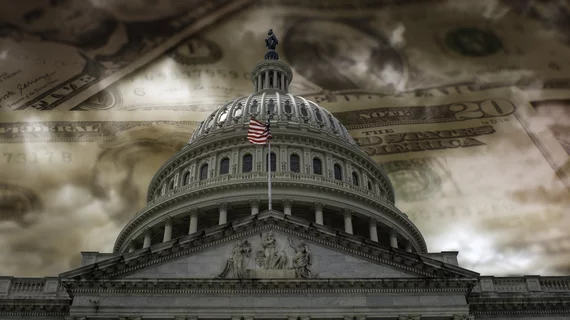Growing number of US senators support bill to address radiologist pay cut
A growing number of U.S. senators are voicing support for legislation to address the Medicare physician pay reduction set to take effect Jan. 1.
Forty-one members of the upper chamber recently penned a letter to colleagues, contending that inaction could impact seniors’ access to care. Led by Sens. John Boozman, R-Ark., and Peter Welch, D-Vt., dozens of lawmakers are asking Senate leaders to address the 2.8% cut to the conversion factor used to calculate physician payments.
This represents the fifth consecutive year physicians will face a Medicare payment reduction, they emphasized. In response, some medical groups have started limiting the number of patients they see, or types of services offered to seniors.
“Persistent instability in the healthcare sector—due, in part, to consistent payment cuts—impacts the ability of physicians and clinicians to provide the highest quality of care,” Boozman, Welch and others wrote to Senate leaders Chuck Schumer and Mitch McConnell on Nov. 21. “These continued payment cuts undermine the ability of independent clinical practices—especially in rural and underserved areas—to care for their communities.”
Along with undoing the 2.8% cut finalized earlier this month, senators also want Congress to develop long-term legislative solutions to reform the Medicare Access and CHIP Reauthorization Act (MACRA). The 2015 law changed how the federal government pays radiologists and other physicians, including value-based care programs. However, lawmakers and physician lobbying groups have sought reforms, such as enacting targeted changes to budget neutrality requirements. Boozman and Welch also suggested the exploration of annual inflationary adjustments to physician pay, a change long sought by the American Medical Association and others.
“These efforts are critical to supporting patient access to high-quality Medicare-covered services and bolstering our healthcare workforce,” the 41 lawmakers added.
The AMA highlighted the senators’ message in a news update published Monday. On Nov. 20, the nation’s largest doc lobbying group—alongside the American College of Radiology, Society of Interventional Radiology and American Society of Neuroradiology—sent its own letter to congressional leaders. Docs echoed some of the Senators’ same points and urged lawmakers to pass a Medicare pay fix before the 118th Congress adjourns. All 50 state medical societies and a total of 77 national organizations signed the message.
They called out the Medicare Patient Access and Practice Stabilization Act, introduced by members of the House in October. The bill has support from some 230 representatives, enough for it to gain passage.
“This legislation will serve as a bridge to broader reform while averting an impending cut that threatens both practice solvency and patient access to care,” ACR, AMA and others wrote.
On Monday afternoon, the Radiology Business Management Association sent a text to members, urging them to reach out to their congressional representatives. They’re asking for passage of legislation to avert the conversion factor cut. Over 10,000 patients, radiologists and clinical leaders have now sent messages to members of Congress through DontCutDocs.com.
“We appreciate the leadership of Senators Boozman and Welch in encouraging colleagues to advance a solution to the dire cycle of Medicare reimbursement cuts. Independent practice is under unprecedented pressure and can ill afford inaction,” Linda Wilgus, MBA, co-executive director of the RBMA, told Radiology Business Monday.

